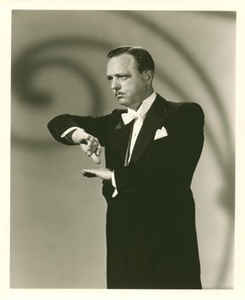Leith Stevens (Leith Stevens)

The music accompanying the film The James Dean Story was composed and conducted by Leith Stevens. An eponymous album containing this music was released by Capitol Records in 1957, and its anonymous sleeve notes say, “Here is the music direct from the soundtrack of The James Dean Story, a different kind of motion picture. This is a film in which there are no actors, there is no fiction. It is, instead, the story of a young man in search of himself – a story of a lonely boy growing into a lonely manhood, of a quest for discovery and meaning, of a great talent and zest for creative expression, and of a tragic end which brought more questions than answers.” The sleeve notes continue, “The life of James Dean is presented on the screen through the means of a new technique – dramatic exploration of a still photograph. Together with tape recordings, existing motion picture material, and the people with whom he lived and worked, these photographs create the presence of the living character. If there are supporting roles in this picture, the parts must be credited to the people of Fairmount, Indiana, where Dean lived as a boy; to the nine million faces of New York City, where he struggled for recognition as an artist and as an individual; and to the men and women of Hollywood who shared in the development of his career.” The sleeve notes then go on to describe the music, “The film’s music is as unusual and exciting as the motion picture itself. Leith Stevens, the composer, captures a haunting reflection of the violent yet strangely understandable uncertainties of modern youth. Stevens, whose musical scores have distinguished such films as The Wild One, Private Hell 36, Destination Moon and Julie, describes the loneliness and frustrations, the fury and tenderness of James Dean’s life and the world in which he moved. With his use of such instruments as the recorder, harmonica and bongo drums, and in his unique utilization of the jazz idiom, Leith Stevens produces music with dynamic personal identification, not only for James Dean, but for every boy who’s ever worn a leather jacket and for every girl who’s ever danced without her shoes. Stevens traces the development of Dean throughout his boyhood, his early rebellion against conventions, the discovery of his artistic abilities, and his failure to resolve his personal problems. “Who Am I?” depicts the young Dean groping for self-identification; “Lost Love” is a painful portrayal of a romance without a happy ending; and “Testing The Limits of Time” is a brilliant montage of the moods and actions which Dean experienced in his last few months. Tommy Sands, the nation’s newest singing sensation, sings the theme song “Let Me Be Loved” by Jay Livingston and Ray Evans.”
Leith Stevens was active in broadcasting at least as early as 1934. Radio highlights listed in an April 28, 1934, newspaper included “Romantic songs have been chosen by Charles Carlile, tenor, for his broadcast with Leith Stevens’ orchestra over WBBM at 5:45.” Stevens worked as an arranger for CBS radio, and his numerous radio credits over several decades include The Abbott and Costello Show, Academy Award Theater, Action Eighty, American School for the Air, Arch Oboler’s Plays, Big Town, The Black Book, CBS Radio Workshop (later called Columbia Workshop), The Doctor Fights, Encore Theater, Escape, The Free Company Rogue’s Gallery, The Burns and Allen Show, The Judge, Lights Out, Men Against Death, The Miracle of America, No Help Wanted, Request Performance,Saturday Night Swing Club, Suspense and radio crime melodrama Yours Truly, Johnny Dollar. Leith Stevens’ first work to be used on cinema was his piano concerto in C minor, for the Hollywood film ”Night Song” (1947). In addition to his prolific TV output, he also co-wrote the Oscar-nominated title song from the 1956 movie Julie starring Doris Day. His other film scores included the George Pal science-fiction classics Destination Moon (1950), When Worlds Collide (1951) and The War of the Worlds (1953), as well as Syncopation (1942), All My Sons (1948), Larceny (1948), The Sun Sets at Dawn (1950), The Atomic City (1952), Beware, My Lovely (1952), The Hitch-Hiker (1953), The War of the Worlds (1953), The Bigamist (1953), The Wild One (1953), Private Hell 36 (1954), Crashout (1955), The Treasure of Pancho Villa (1955), The Garment Jungle (1957), Ride Out for Revenge (1957), Eighteen and Anxious (1957), The Green-Eyed Blonde (1957), Violent Road (1958), The Gun Runners (1958), But Not for Me (1959), The Gene Krupa Story (1959), Hell to Eternity (1960), The Interns (1962), A New Kind of Love (1963), The Night of the Grizzly (1966), Chuka (1967) and Assault on the Wayne (1971). He also provided uncredited contributions to the Frank Capra film classic It’s a Wonderful Life. Stevens died at the age of 60 due to a heart attack after learning that his wife had died in a car accident.
Born
- September, 13, 1909
- USA
- Mount Moriah, Missouri
Died
- July, 23, 1970
- USA
- Los Angeles, California
Cause of Death
- heart attack

